Kettering, The "Holy City", Northamptonshire
An encouragement to Primitive Methodists to engage in evangelism.
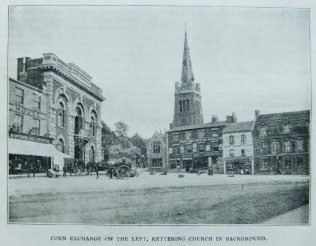
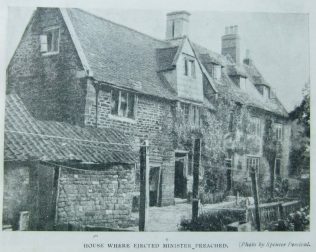
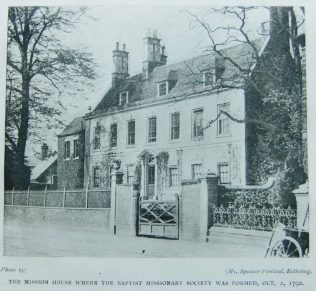
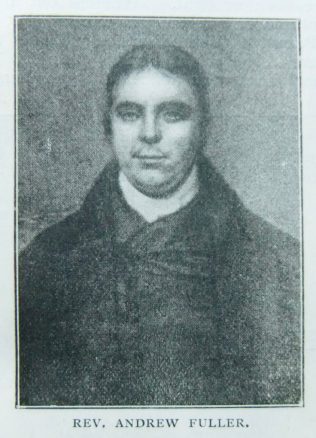
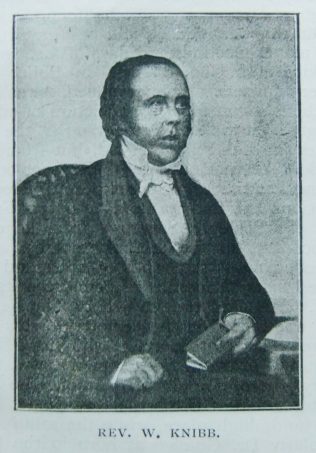

Transcription of Article in the Christian Messenger by G. Bicheno
Situated in the North-Eastern portion of Northamptonshire, the town from its elevation has the advantage of pure and bracing air and with its other attractions should become a leading inland health resort. Kettering – Anglo-Saxon Cyteringan (which signifies a tribe or clan of cottars) – probably dates back to times remoter than the Anglo-Saxon period, as numerous Roman coins have been found in the neighbourhood, and there are indications that the Romans carried on iron-smelting here. Its first distinct mention is in 956, when King Edwy granted the Manor to his thane; Aelfsige, the goldsmith.
Soon afterwards we find the Manor in possession of the Abbey of Peterborough. With the exception of a period of rapine and violence by one Leotsi, this possession lasted till the time of Henry VIII., to whom the Manor of Kettering, and the Abbey itself, were surrendered. Henry granted all the land in Ketterynge to Lord Parre de Horton. In the time of Charles I. Kettering stoutly resisted the collection of ship-money.
A serious fire in 1679, which consumed many houses and other buildings, gave opportunity for the expression of the hatred and suspicion which the Catholics of the day generally inspired.
Elections here are notably “lively” events, and public meetings and discussions are often decidedly interesting. As an example of this and also as setting forth the present change in public and religious opinion in regard to one of the great questions of the day, it is worth noting that when Thomas Whittaker first came to Kettering to advocate teetotalism in 1837 his coming was heralded on the previous Sunday by the Rev. W. Robinson, preaching from the text “Be not righteous over much,’ while the Rev. J. Jenkinson chose as his “Beware of false prophets.” The latter took the chair at Mr. Whitaker’s meeting, and expressed the hope that the day would soon come when every working man would have at least “two pints of ale a day”; and the lecturer was howled down and finally prevented a hearing and only escaped maltreatment through the protection of Mr. Gotch and two friends. It is only fair to add that Mr. Jenkinson was soon afterwards converted and became an ardent worker in the cause.
A new trade has developed to large proportions during the last half century, and the town has now advanced to about 30,000 inhabitants, and bids fair to grow still further while boots and shoes wear out, and feet that need them multiply.
Church accommodation has been largely extended of late, but it is far short of the needs of the population. The parish church is a splendid specimen of the churches peculiar to this district, having a magnificent spire.
In the Vestry is an interesting reminder of a bygone age in the shape of a chained Bible. Other churches belonging to the Establishment have in recent years been erected, and vigorous propaganda of High Church principles, combined with a measure of evangelistic fervour and some degree of social sympathy are pursued.
One of the ablest and best known of the past rectors was Thomas Allen (1714), a distinguished preacher and a writer of some merit, though the following from the preface of his poems would not seem to give the stamp of undue modesty: “All that have Mr. Milton’s fine poem, which too abruptly leaves off at Our Saviour’s Conquest over the Devils Temptations, would do well to furnish themselves with this little piece, which compleats or rather realiseth his design.”
Born in the fire of persecution, Noncomformity has all along been a great force in the town’s life. Mr. Maidwell, the rector ejected in 1662, preached in his house and various houses, until in 1672, by virtue of a Declaration of Indulgence, he was given a license to preach at “Widow Cooper’s, Kettering.”
The photograph shows one of the preaching places, and through an aperture the good man and his congregation more than once escaped when the soldiers beset the house, while the Five Mile Act was in operation.
A Meeting House was afterwards secured, and the church he formed exists still, as the Toller Independent, named after the Tollers – father and son – whose united pastorates covered 100 years. Recently a second Congregational Church has been erected, a substantial and imposing building on the London Road.
The Quaker community is now small, but its early history here is an inspiring record of heroism.
The Baptist cause, though its origin appeared insignificant, presently became one of the outstanding Baptist Churches of the whole country. William Wallis was its first pastor, and under one of his sermons from the text, “Adam, where art thou?” the celebrated Dr. John Gill, a native of Kettering, was converted. Andrew Fuller, its most distinguished Pastor, was born at Wicken, near Ely, on February 6th, 1754. Prone in youth to the sins of lying, cursing and swearing, he became religiously impressed and gradually broke off these evil habits, but not until his 16th year did he find Gods salvation. It was largely through his father’s corn thresher that he was eventually enabled to believe, and the picture of the youth seeking the society of this humble working-man for prayer and converse, and then lending him a hand at his work for a few hours to make up loss of time, is idyllic in its sweetness and beauty.
The family had removed to Soham early in Andrew’s life, and here he accepted a call to be the minister of the church when scarcely through his teens. Even in those youthful controversies and had strong leanings to the hyper-Calvinistic views. After long and painful hesitation he complied with the request of the Kettering Church and became its minister in October, 1782. Here a sphere of wide usefulness opened to him.
His “Gospel worthy of all acceptance, or the duty of sinners to believe in Jesus Christ,” caused a great amount of controversy. In it he had advanced from the hyper-Calvinism of younger days to what he accounted true Calvinism, which places due responsibility upon man to receive the Gospel. His “Calvinism and Socinian Systems examined” also circulated widely, while his published sermons, letters, etc., make up a tonic of about 1,100 pages folio.
But his abiding distinction is in connection with the “Particular Baptist Society for the Propagation of the Gospel among the Heathen.” There is no doubt that the Missionary spirit, through which this first of Modern Missionary Societies found its embodiment, was induced and had its birth in the prayer meetings and days of fasting and seeking after God, arranged by Fuller with other ministers. The first meeting was held at the Mission House ( a picture of which we give) on the 2nd October, 1792, the first collection being £13 2s 6d, but from this modest sum not only was Carey sent out to India, but the whole movement of Modern Missions has had its flow. Andrew Fuller was the Society’s Secretary from its commencement to the end of his life, and travelled many thousands of miles and collected many thousands of pounds on its behalf. He died on the 7th of May, 1815, and was buried in the cemetery of his own Chapel, and hither men who have been blest by Missions make pilgrimage from every part of the globe. Among the later Pastors of the Church the Rev. James Mursell holds high place, while the saintly and scholarly Dr. Gotch was born in the town and trained in its communion. One other name conspicuous in connection with Missions must suffice. William Knibb, born in Kettering in 1803, went as a Missionary to Kingston in 1824. He and his fellow-Missionaries did all they could to prevent the negro riots, but were blamed and persecuted afterwards by the Government for inciting them. Home to represent the West Indian Missions in 1832, he attended the Annual Meeting, and at the risk of his position and everything he denounced slavery and demanded its abolition. “He stood up – he began. Fact was piled upon fact, horror upon horror. He declared that the Society’s Mission in Jamaica could no longer exist without the entire and immediate abolition of slavery. In the space of half-an-hour distance was annihilated, time forgotten, and the audience found itself in Jamaica surrounded by the oppressors and oppressed amidst whips and fetters.” The Committee were staggered, the Secretary pulled his coat-tail, but in vain. “I will speak. At the risk of my connection with the Society and all I hold dear, I will avow this; and if the friends of Missions will not hear me, I will turn and tell it to my God, not will I desist till the greatest of crimes, slavery, is abolished.” He carried the meeting with him, and ultimately the country – Lord Stanley’s Bill for the abolition of Colonial slavery being introduced in the following May. Mr. Knibb returned to his charge, and as the clock struck 12 on August 1st, 1838, they together shouted “The monster is dead! The negro is free! Three cheers for the Queen!” and on the following morning gave public sepulture to the whips and fetters of the hideous tyranny. Mr. Knibb was one of the leading speakers at the jubilee of the Missionary Society, which was fittingly held at Kettering, the birthplace of Modern Missions, as was also the centenary in 1892.
Wesleyanism Methodism holds a strong position here. John Bond of Ecumenical Methodist fame was born here.
It is worth noting that so universally did the people attend worship a century ago, that Kettering was dubbed in derision by other places the “Holy Land” or the “Holy City.” It has sadly lived down such a name. The inrush of a new population, of all creeds and of no creed, has completely changed its character. Secularism largely abounds, and drink, gambling, Sabbath desecration and materialism are the debasement of thousands.
Has Primitive Methodism a right to existence or a message to deliver in a town like this? Hitherto it has by no means vindicated itself.
With the Circuit centre several miles away, no minister ever living in the town, our name unknown, our position despised, what wonder little has been done by us to evangelise the people and to make proof of our Mission.
Last Conference, however, formed Kettering into a separate station, and we have opened up a new campaign in the Corn Exchange, where already signs and wonders have been wrought. Whereas but a few months since a dozen or so were all that met in Primitive Methodism’s name, we now secure 200 at a Sunday service, our School has grown apace, our membership already reaches 50, and although the stigma of the past has still to be lived down, a work of no mean promise is begun.
Let us pray that from the ranks of Kettering Primitive Methodists there may arise some future William Knibbs and Andrew Fullers, tall leaders in the service of the Lord, and through our “Forward Movement” we may help to restore to the town its fair but now lost name, the “Holy City.”
References
Christian Messenger 1902/10





Comments about this page
The 1904 Primitive Methodist magazine (page 997) makes a strong case that the society in Kettering needs appropriate accommodation. . When Mr Bicheno went to the station, there were 27 members; by the magazine note there were 172, despite Rev Bicheno’s poor health.
Add a comment about this page